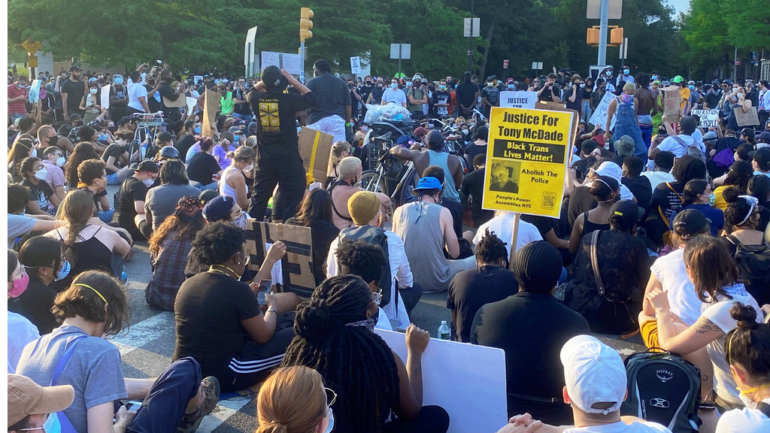
Protesters in Brooklyn, New York, peacefully demonstrate about racial injustice. /UN
The UN Human Rights Chief said on Wednesday that voices calling for an end to “the endemic and structural racism that blights US society” must be heard and understood, for the country to move past its “tragic history of racism and violence”.
UN High Commissioner for Human Rights Michelle Bachelet said in a statement. “The voices calling for an end to police violence need to be heard”.
Protests first erupted on 25 May, after video footage went viral on social media of a Caucasian police officer in the city of Minneapolis kneeling on the neck of 46-year-old African American George Floyd, for more than eight minutes, causing his death while in police custody.
Over the past week, tens of thousands of demonstrators have since taken to the streets of more than 300 US cities, as well as other large urban centers around the world, to take part in mostly peaceful protesting calling for racial justice, but oftentimes chaotic streets have also borne witness to looting, bloodshed and violent policing tactics.
At all times, but especially during a crisis, “a country needs its leaders to condemn racism unequivocally”, Ms. Bachelet submitted.
She continued to say that those in charge must also “reflect on what has driven people to boiling point; to listen and learn and to take actions that truly tackle inequalities.”
Stem the violence
With injuries and deaths sustained by both protesters and police alike, the High Commissioner repeated her calls to demonstrators to peacefully express their demands for justice, and for the police to “take the utmost care not to fuel the situation”.
“Violence, looting and the destruction of property and neighbourhoods won’t solve the problem of police brutality and entrenched discrimination”, she said, calling for independent, transparent investigations.
Ms. Bachelet also voiced concern over statements that have label protesters as terrorists or delegitimize peaceful demonstrating, saying, “there can be no doubt as to what or who is ‘behind’ these protests”.
She pointed to the “thousands upon thousands of peaceful protesters” as well as police officers and National Guard troops, who have responded without resorting to violence, and exercised restraint.
Break impunity cycle
The anger in the US, erupting as the novel coronavirus pandemic exposes glaring inequalities in society and following the loss of more than 100,000 lives to the deadly disease, illustrates why “far-reaching reforms and inclusive dialogue are needed” to break the cycle of impunity for unlawful police killings and racial bias in policing, upheld the High Commissioner.
Moreover, she maintained the need for “a profound examination” of wide-ranging issues, including socio-economic factors and deep-seated discrimination.
“To move forward”, concluded the UN rights chief, “communities must be able to participate in shaping decisions that affect them and be able to air their grievances.”
Other voices
Meanwhile, High Representative for the UN Alliance of Civilizations Miguel Ángel Moratinos tweeted that the death of George Floyd in police custody is “another reminder that racism – and all forms of discrimination based on religion, ethnicity, color, or gender – is also a pandemic”.
And Audrey Azoulay, Director-General of the UN’s educational and scientific organization, UNESC, stressed that racism “kills, jeopardizes social contract, undermines the future and destroys societies from inside”.
“The fight against racism begins in the minds of men and women, through quality education”, she declared.
(With input from United Nations)
 CGTN America
CGTN America